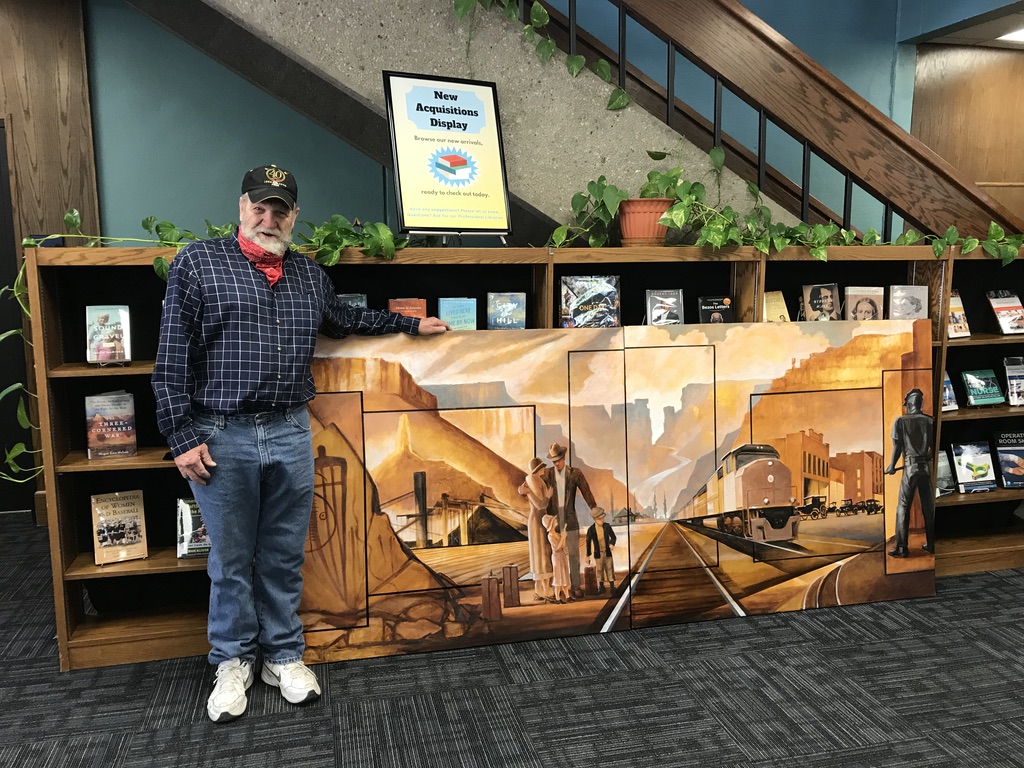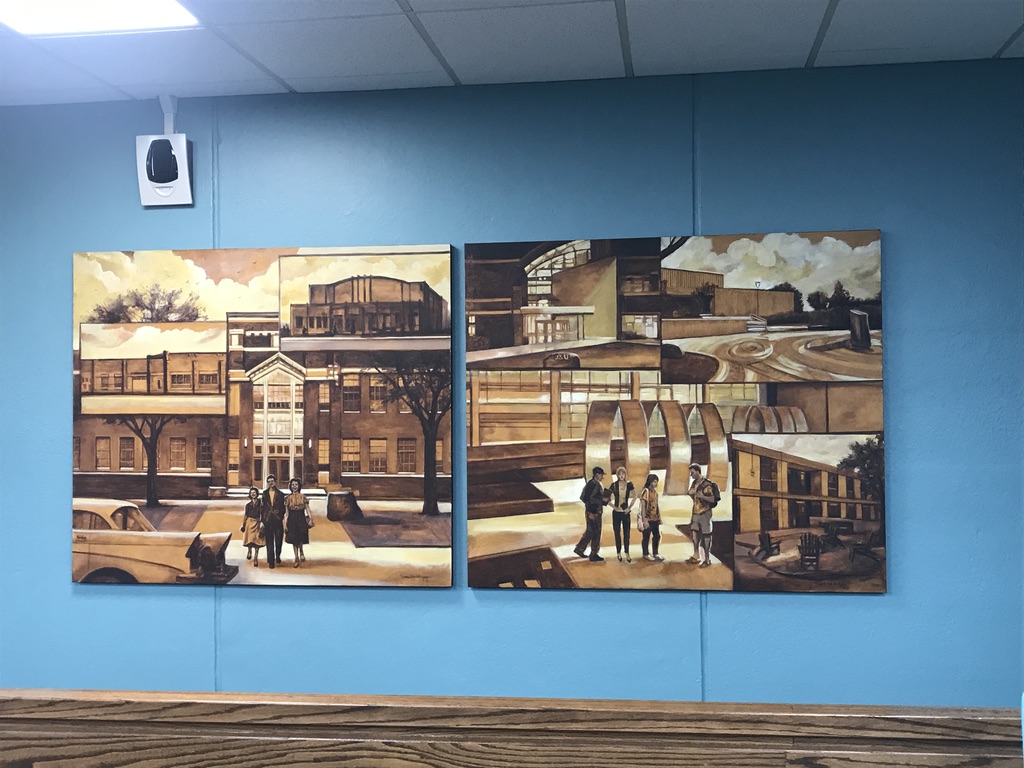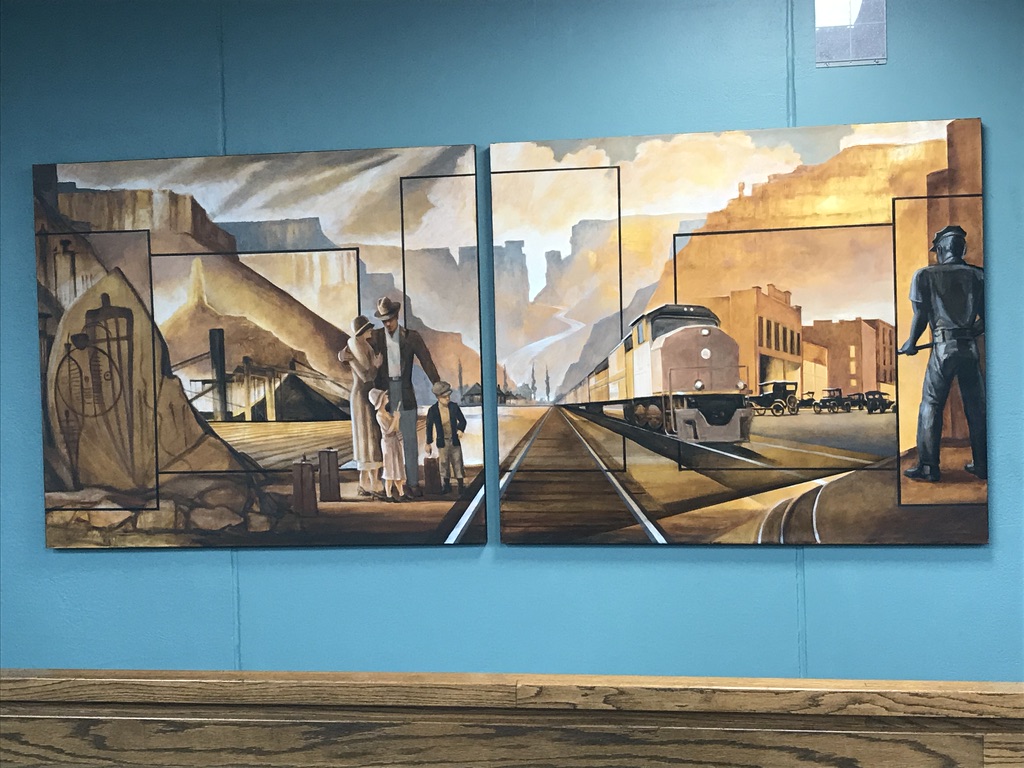Paintings feature history of Eastern Utah in LLC



In March, the Utah State University Eastern Library Learning Commons welcomed two new residents in the form of canvases. Two new paintings by Helper artists now hang in each staircase, lighting up the upper level of the library with their glowing colors. The paintings celebrate the vibrant and colorful history of both the college and Castle Country.
In recent years, Helper has experienced an art renaissance from local artists creating scenes commemorating the history of Castle Country. Thomas Elmo Williams and David Richey Johnsen’s paintings are featured throughout the surrounding area.
Aimee Lauritsen, Library and Learning Commons public service manager, wanted to bring their artwork onto campus. “They have done so much for the local area and their artwork is significant,” Lauritsen said.
Initially the library commissioned Williams to create one painting to be hung in the Bess Jones study room. After discovering an issue with steam in the study room, the painting would need a new location. An open space in the staircase was found. The new location made it possible for two paintings to be displayed. The library also commissioned Johnsen to create a painting to be hung in the second staircase.
Hanging in the east staircase is Past and Present Buildings: Always Housing Our Future, 2020, by Williams. Two 48”x56” canvas panels feature past and present scenes from the college.
The left panel features 1960’s-era college students leaving the Reeves Building. The students smile at one another and walk close, displaying friendship and connection. The warm tones of orange and sienna give the impression of and autumn sunset. A tree to the left of the students is beginning to lose its foliage while autumn birds lightly hover overhead.
Framed above the students is an image of the old student center. Another frame is of the old music building that was demolished in 2015. Sunlight reflects from the clouds positioned behind the buildings, bringing light and playfulness in to contrast the rigid lines of the buildings. Gibby sits in front of the Reeves building, proudly displaying “CEU,” reminding the viewer of the rich history of the College of Eastern Utah.
The right panel features modern students visiting in front of the Central Instruction Building. The Waves Sculpture and the building’s modern glass wall brilliantly reflect sunlight. In the top left, the Jennifer Leavitt Student Center is featured with its curving architecture and light emanating from within. In the top right, the Library and Learning Commons is shown as it is today with the pet rified log and spiraling tilework landscaping. The bottom right frame shows the quiet patio in front of Sessions hall. In this frame is a tree whose foliage matches the tree in the left panel, connecting the seasons. Above the library are billowy clouds reflecting the sunlight. Gibby sits in front of the Jennifer Leavitt Student Center, proudly displaying “USU,” reflecting the current Utah State University name the college bears.
Much has changed in the local history and the painting shows the contrast of the college through the years. The painting affectively captures a sense of a shared foundation and consistent shared goals for the future. While names, buildings and fashion trends change, this space has remained the same. School starts at the same time each year with the ever-consistent goal of a better future for individual students and the community.
Displayed in the west staircase is On Steel Rails, 2020, by Johnsen. This painting lights up the library with scenes of Castle Country’s vibrant history.
The center features a 1920’s-era family waiting for a train in Helper. Surrounding this center scene are frames of the area’s past.
On the far left, ancient Indian artwork from Nine-Mile Canyon is painted on rock faces.
The second frame displays Pinnacle Peak, irrigated farmland and images of conveyor belts from a coal mining plant.
The center frame highlights the railroad and highway emerging from Castle Gate before it was destroyed. A small house and tall cottonwood trees sit at the base of the canyon.
The third frame is of Helper city main street. Model T Fords are parked in front of brick shops.
The final frame is of the Big John statue in Helper. His back is toward the viewer as he watches history happen around him. The family is situated organically between the frame of coal mining and the railroad. The train engine is situated between the railroad and Helper main street scenes.
While there are distinct moments in Castle Country’s history shown in this painting, everything is connected. The painting captures a sense of historic wholeness.
Paintings by Williams and Johnsen can be seen throughout the community. Several paintings are displayed at the Castleview Hospital and many at the Boxcar Gallery in Helper.




